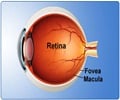
Despite such importance, the mechanisms that regulate the function of RPE65 are unknown. To identify and characterize previously unknown inhibitors of RPE65, the scientists tested five candidate proteins. Using gene screening, the LSUHSC research team discovered that one of them – fatty acid transport protein 4 (FATP4) – is a negative regulator; it inhibits RPE65. "We found that FATP4 protects retinal photoreceptor cells from experimentally-induced retinal degeneration," notes Nicolas Bazan, MD, PhD, Boyd Professor, Ernest C. and Yvette C. Villere Endowed Chair of Retinal Degeneration, and Director of the LSU Health Sciences Center New Orleans Neuroscience Center of Excellence, who is a co-author of the paper.
Recently, mutations in the human FATP4 gene have been identified in patients with a certain recessive disorder which also features one of the toxic byproducts associated with abnormal visual cycles. This byproduct, called A2E accumulates in retinal pigment epithelial cells with age, prompting a call for further investigation to determine whether FATP4 mutations cause age-related vision impairment and retinal degeneration."These findings suggest that FATP4 may be a therapeutic target for the inherited retinal degenerative disease caused by RPE65 mutations and AMD," concludes Dr. Jin.
Source-Eurekalert












